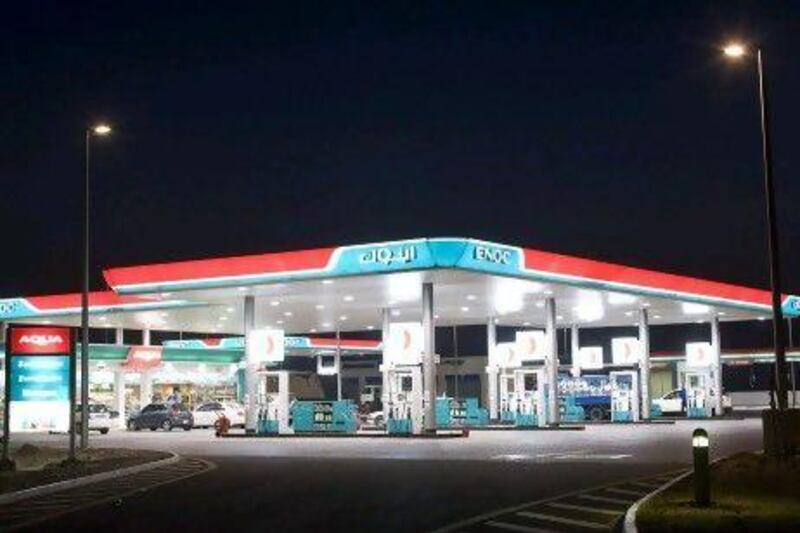Four months after its petrol pumps in the Northern Emirates ran dry, Emirates National Oil Company (Enoc) is holding out hope for the Government to help get them running again.
The retailer, based in Dubai, stopped refilling stations in the neighbouring emirates after sustaining billions of dirhams in losses selling fuel at the federally mandated price.
Yesterday, a top Enoc executive expressed hope for a Government change of heart.
"Our network continues to be there. Yes, we are not pumping fuel today," said Zaid Alqufaidi, the managing director of marketing at Enoc. "But once the decision is taken on the pricing, I think it will [start]."
The UAE keeps petrol prices at artificially low levels to help keep the cost of living in check. This year Enoc and its retailing competitor Emarat came under pressure as the oil price climbed as high as US$126 a barrel while they had to continue selling fuel at last year's prices.
Last year, Enoc paid Dh1.5 billion (US$408.8 million) to make up for the difference, and this year its bill was projected to rise to Dh2.7bn, the company said in April.
In May, many motorists in the Northern Emirates endured long queues at stations only to be turned away without fuel. Enoc employees were noncommittal, saying the stations were undergoing unspecified technical upgrades.
Yesterday, Mr Alqufaidi was more direct. "The whole thing stems from the pricing," he said. "We procure the product at the very high price and we are forced to sell it at regulated price. The differential gets absorbed by the company, and this is not sustainable."
The fuel shortage prompted changes throughout the UAE. Abu Dhabi National Oil Company, the state producer, began opening more outlets outside its home emirate afterSheikh Mohammed bin Zayed, Crown Prince of Abu Dhabi and Deputy Supreme Commander of the UAE Armed Forces, ordered it to help out.
The federal Government offered Emarat, a state-owned petrol retailer that had racked up Dh1.9bn in debt, a 50 per cent rise in capital to $2.45bn. And Sharjah ordered Enoc to resupply its stations or shut them down. Enoc shut them down, but in the other Northern Emirates it continued to sell diesel and to offer services such as car washes, which remain profitable.
"It really depends on the Abu Dhabi Government, on how they wish to deal with this," said Thaddeus Malesa, an independent Gulf energy analyst. "Will it be a direct transfer to Enoc? Will it be a transfer to consumers in the Northern Emirates? This is a debate [over the size of the subsidy and who should pay it] that has happened over multiple years."
Mr Alqufaidi said Enoc was moving into other businesses as part of a hedging strategy.
Last week, Enoc Retail, the company's unit that oversees its convenience stores and food outlets, announced it would expand its presence across the region.
Meanwhile, Enoc is investing as much as $200m to build fuelling stations for cars that run on compressed natural gas, which proponents say is more cost-effective and friendlier to the environment.
Dubai Municipality and the Roads and Transport Authority have committed to retrofitting a quarter of their fleet over the next three years, said Mr Alqufaidi.





